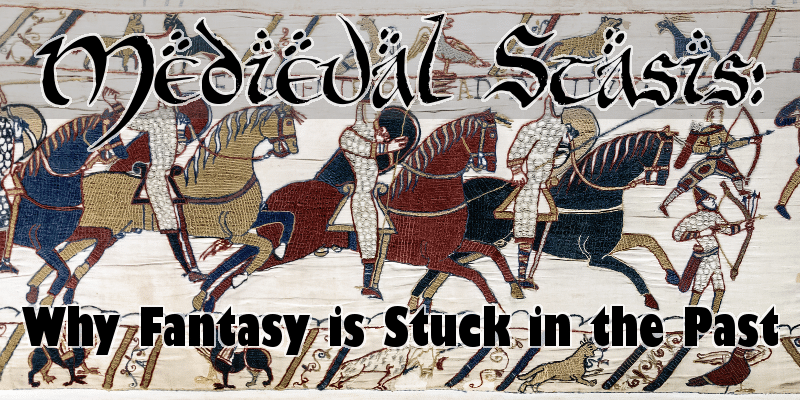
You’re reading a story about a knight, a huntsman, and a wizard. They stumble across the ruins of a lost civilization, but something seems strange. That ancient culture seems to have had the same technology as the knight and his companions. Implication is that in the past 1000 years or so, there has been no change in technology. Why is that?
Medieval Stasis – The state of keeping a world as a perpetual medieval setting
But of course, this is fiction, so it’s really all the author’s doing. So what is the reasoning behind medieval stasis?
From the author’s point of view
Worldbuilding can be an exhausting process. You try to think of every detail when portraying a world, but one slip and you can ruin the illusion. So if you’re going to make a world that’s thousands of years old, you can imagine the pitfalls of trying to set up a timeline not only of history, but of scientific and technological advancement as well.
So instead of risking making some subtle error that would render a 2000 year history implausible, they simply keep the world the same all that time.
How do you explain away Medieval Stasis?
No one wants to admit that it’s too much work portraying advancing technology. So authors come up with various ways to explain the phenomenon within their fictional setting.
Technological Suppression
Someone doesn’t like science and technology, and they actively prevent modernization. Maybe the church finds science heretical. Maybe magic users don’t like the competition. Or it could be a simple case of dogma persisting beyond anyone’s ability to remember why.
Magic does it better
Why bother with science when magic can do everything with so much less work? Need a crane? Levitation. Want to get somewhere in a hurry? Teleportation. And with bother with guns when fireballs do more damage?
If you put enough magic into a world and make it accessible, maybe you can quiet down all those would-be da Vincis and Teslas before your world ever hears from them.
Ancient Races
Societies change, but individuals are prone to getting set in their ways. If only a few generations have passed since that ancient era (even if that generation is only among the ruling elite), then maybe change has just been happening too slowly to notice.
Cyclical Technology
A number of setting have taken the rise and fall of science as a plot point. By giving little hints of a science that once was, the author can show that advancement has happened, but has since been undone. Perhaps the knowledge that science either created or could not prevent the cataclysm that set the world back might be reason enough not to pursue it (or persecute those who try).
Magical Interference
Demons and spirits enter the mortal world under the new moon and wolfsbane causes rocks to soften in a coal fire. Maybe this isn’t the ideal environment for science to flourish. With supernatural outcomes to mundane activities being commonplace, there might not be many opportunities for scientific theories to flourish. As for technology, who wants to consult a star chart to see whether the Spark Star is in ascension before they try to light a lantern? A few words from the Book of Ignos, the Fire God are quicker and easier.
How to avoid the pitfall of medieval stasis
If you’re intent on writing in a medieval setting, there’s a quick and easy way to avoid stasis: Don’t overdo history!
You don’t need a civilization to stretch back 10,000 years to make it seem old. Just give it enough history to feel realistic.
Your other option is to embrace Medieval Stasis. There are no rules as to what you can and can’t write. If you write it well, readers will enjoy it. The real trap is in giving your reader something that feels false and forced. Think through your reasoning and your presentation of the world you show your reader, and you can do anything well.

0 Comments